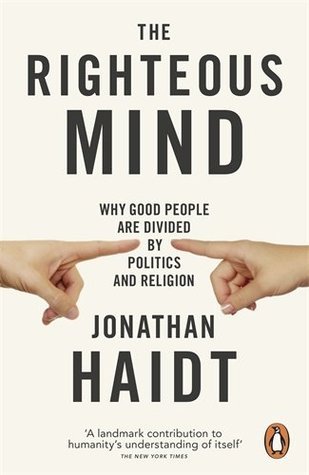This title is currently out of stock. Leave us your email address, we’d let you know when it’s in stock again!
-

A note on book covers: while we do our best to ensure the accuracy of cover images, ISBNs may at times be reused for different editions of the same title which may hence appear as a different cover.
The Righteous Mind: Why Good People Are Divided by Politics and Religion
The Righteous Mind: Why Good People Are Divided by Politics and Religion
Couldn't load pickup availability
His starting point is moral intuition—the nearly instantaneous perceptions we all have about other people and the things they do. These intuitions feel like self-evident truths, making us righteously certain that those who see things differently are wrong. Haidt shows us how these intuitions differ across cultures, including the cultures of the political left and right. He blends his own research findings with those of anthropologists, historians, and other psychologists to draw a map of the moral domain. He then examines the origins of morality, overturning the view that evolution made us fundamentally selfish creatures. But rather than arguing that we are innately altruistic, he makes a more subtle claim—that we are fundamentally groupish. It is our groupishness, he explains, that leads to our greatest joys, our religious divisions, and our political affiliations. In a stunning final chapter on ideology and civility, Haidt shows what each side is right about, and why we need the insights of liberals, conservatives, and libertarians to flourish as a nation.
Details of Book
A note on book covers: while we do our best to ensure the accuracy of cover images, ISBNs may at times be reused for different editions of the same title which may hence appear as a different cover.

-
One Line Summary
Explores moral psychology behind political and religious divides.
-
Who is this book for?
If you're curious about why people deeply disagree on politics and religion, this book offers fascinating insights into the roots of moral intuition and groupism. Haidt's engaging blend of research and real-world examples helps us understand others' perspectives and the importance of empathy across divides. It's a thoughtful read for anyone interested in fostering understanding and dialogue in divided communities.

